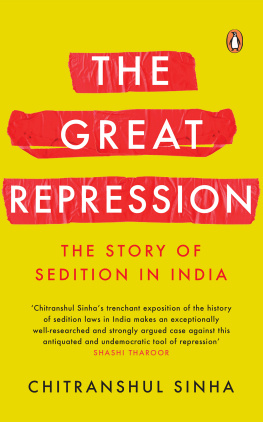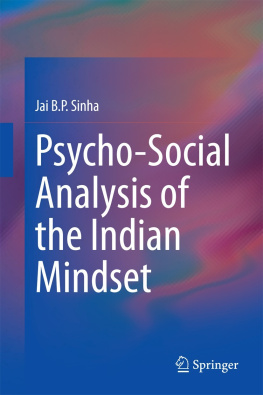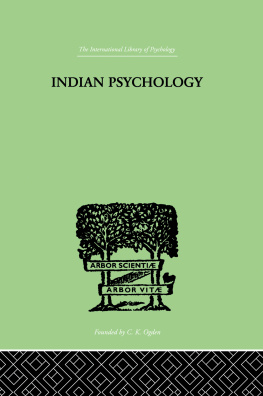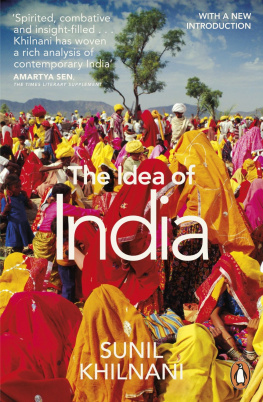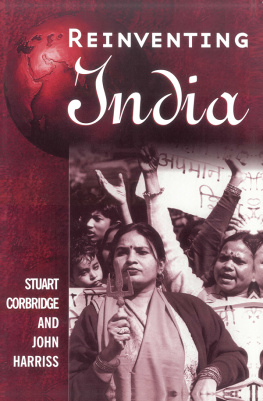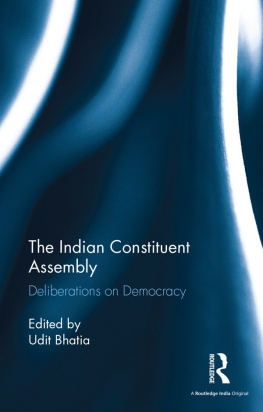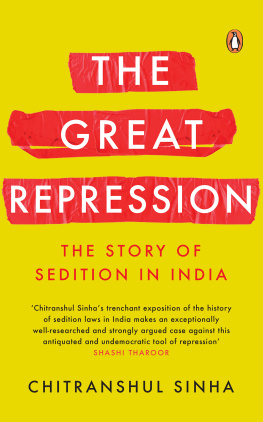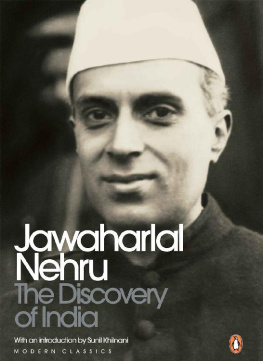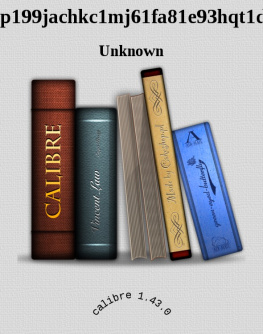Chitranshul Sinhas trenchant exposition of the history of the sedition law in India makes an exceptionally well-researched and strongly argued case against this antiquated and undemocratic tool of repression. His exceptionally readable analysis has been critically positioned within the structures and practices through which the concept of sedition emerged, making it an insightful work of great relevance for our timesShashi Tharoor, member of Parliament from Thiruvananthapuram
The book concisely chronicles the entire 150-year journey of the law of sedition from its insertion in the Indian Penal Code in 1870. Despite the extensive and inevitable legal content, the book is highly readable and Chitranshul Sinha makes a compelling case for the repeal of Section 124Aas has been done in the UK, the country of its originArvind P. Datar, Senior Advocate
Justice Dhananjaya Y. Chandrachud
Acknowledgements
T he idea of writing a book, any book, took flight when Rukun Kaul, a dear friend, declared one fine evening that she thought I was going to write a book. This decree was pronounced while discussing the future and our expectations from it. She followed up her pronouncement by connecting me to Manasi Subramaniam, editor extraordinaire at Penguin Random House India. Manasi then guided me towards the idea of writing the story of sedition in India and helped me crystallize the pitch and the structure. After that she granted me complete freedom and never ever interfered or tried to influence my work. As a professional working in a high-stress environment, being granted such freedom was a breath of fresh air. Thank you, Rukun, and thank you, Manasi.
The idea of writing anything for public consumption was given a push by another dear friend, Apar Gupta. He pushed me to write and connected me with Rukmini Srinivasan at Huffington Post, for whom I wrote my first article. Rituparna Chatterjee, who was then an editor at Huffington Post, and whom I have the privilege to call a friend now, enabled me to write even more and helped me develop my writing style as well as my confidence. Thanks, guys.
The amount of research involved in this book was monumental. I would not have been able to take a deep dive without the help of my colleague Sonali Khanna, who is a bright young lawyer to watch out for, and Akshay Sharma, who is one of the brightest law students I have come across. Deepa Kumar helped me source research material which otherwise would have been unobtainable for me thanks to the gatekeepers of knowledge. I also want to thank all my colleagues in my office for their support and constant encouragement. Dua Associates, the law firm where I work, has one of the best work environments which granted me the freedom to write while working full-time.
I owe a debt of gratitude to my friends and colleagues Alok P. Kumar, Gautam Bhatia, Aastha Dhaon and Konark Tyagi for looking at my manuscript despite having extremely busy lives. Their suggestions and inputs were invaluable and helped me provide the final shape to this book. Siddharth Singh chipped in with excellent tips and advice despite being occupied with writing his own book, the excellent TheGreat Smog of India. Asmita Bakshi and Avantika Mehta, excellent journalists both, provided brilliant suggestions for deciding the books title, which is an extremely underrated task. Super-cop A. Sai Manohar (IPS) provided insights and guidance on legal procedure and data without which a critical part of the book would have remained insufficient. His grace was demonstrated by the fact that he took time out to help me despite being busy beyond belief. I am really grateful for his help. Special thanks to my brother, Ayushman, for being my sounding board and for patiently listening to my rants.
This book would never have been completed without the support of Esha Sharma, my wife, who suffered through a year of lost weekends (and weekdays) with nothing but encouragement. She forsook important occasions for my sake, raised my spirits and kept me on the right path every time I was just about ready to throw in the towel. Her help at crucial junctures is invaluable. This book is as much hers, if not more, as it is mine.
Lastly, writing in this medium would not have been possible without the English language education that my parents provided me with despite all odds. They ensured that my brother and I studied in the best schools and colleges while fighting off financial constraints. My brother and I never felt that we did not have enough, or we were not good enough. They taught us life.
Prologue
T he Indian Express published a story on 20 June 2018 about how the police in the Rohtas district of Bihar arrested eight people, five of whom were minors, on charges of sedition for dancing to a song whose lyrics meant, We are Pakistani mujahids, protectors of Earth; if you challenge us even by mistake, we will cut you up. The arrests occurred after a video of the song and dance was given to the police by a right-wing organization.
They must have danced to the beatthe song barely played for three or four minutes, the parent of one of the boys said. According to the brother of another minor boy, The children were dancing in joy. Most of them realized that some objectionable and controversial song had been played only after the ruckus following police intervention. The father of another boy said, Sedition charges against these little boys have hurt us badly. There has never been any communal riot in Nasriganjs history. In this town you can still hear the azaan and Ram dhun going on simultaneously. We are trying to hire a good lawyer and pinning all hopes on the judiciary.
The Indian Penal Code (IPC) of 1860 was the first ever codification of offences and penalties in India. Chapter VI of the Indian Penal Code provides for Of Offences against the State, within which falls Section 124A which lays down the offence of sedition. The capital alphabet A suffixed to 124 signifies that the provision was not a part of the original penal code as enacted in 1860. Section 124A was slipped in between Section 124 (assaulting President, Governor, etc. with intent to compel or restrain the exercise of any lawful power) and Section 125 (waging war against any Asiatic power in alliance with the Government of India) of the code in the year 1870, marking the first time that sedition was defined in a statute in the common law system.
Section 124A was amended for the first time in 1898, and thereafter underwent multiple changes in the years 1937, 1948, 1950, 1951 and 1955. After the amendment of 1955, Section 124A has been left untouched by Parliament, and in its present form reads as under:

